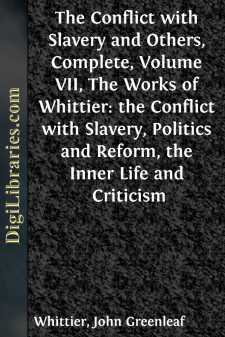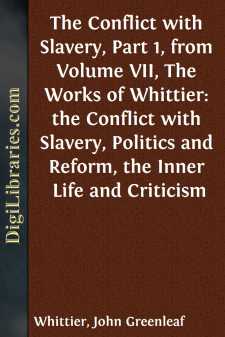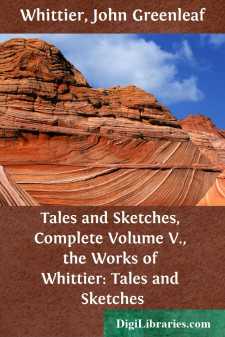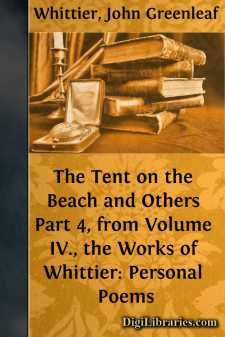Categories
- Antiques & Collectibles 13
- Architecture 36
- Art 48
- Bibles 22
- Biography & Autobiography 813
- Body, Mind & Spirit 142
- Business & Economics 28
- Children's Books 14
- Children's Fiction 11
- Computers 4
- Cooking 94
- Crafts & Hobbies 4
- Drama 346
- Education 46
- Family & Relationships 57
- Fiction 11829
- Games 19
- Gardening 17
- Health & Fitness 34
- History 1377
- House & Home 1
- Humor 147
- Juvenile Fiction 1873
- Juvenile Nonfiction 202
- Language Arts & Disciplines 88
- Law 16
- Literary Collections 686
- Literary Criticism 179
- Mathematics 13
- Medical 41
- Music 40
- Nature 179
- Non-Classifiable 1768
- Performing Arts 7
- Periodicals 1453
- Philosophy 64
- Photography 2
- Poetry 896
- Political Science 203
- Psychology 42
- Reference 154
- Religion 513
- Science 126
- Self-Help 84
- Social Science 81
- Sports & Recreation 34
- Study Aids 3
- Technology & Engineering 59
- Transportation 23
- Travel 463
- True Crime 29
John Greenleaf Whittier
John Greenleaf Whittier was a prominent 19th-century American poet and abolitionist known for his advocacy against slavery through both his literary works and political activism. Born in 1807 in Haverhill, Massachusetts, he was a key figure in the American literary movement and a founding member of the American Anti-Slavery Society. His best-known works include the poem "Snow-Bound," which nostalgically reflects on rural life and family, earning him widespread acclaim.
Author's Books:
Sort by:
AT SUNDOWN TO E. C. S. Poet and friend of poets, if thy glassDetects no flower in winter's tuft of grass,Let this slight token of the debt I oweOutlive for thee December's frozen day,And, like the arbutus budding under snow,Take bloom and fragrance from some morn of MayWhen he who gives it shall have gone the wayWhere faith shall see and reverent trust shall know. THE CHRISTMAS OF 1888. Low...
more...
PROEM I LOVE the old melodious laysWhich softly melt the ages through,The songs of Spenser's golden days,Arcadian Sidney's silvery phrase,Sprinkling our noon of time with freshest morning dew. Yet, vainly in my quiet hoursTo breathe their marvellous notes I try;I feel them, as the leaves and flowersIn silence feel the dewy showers,And drink with glad, still lips the blessing of the sky. The...
more...
JUSTICE AND EXPEDIENCY OR, SLAVERY CONSIDERED WITH A VIEW TO ITS RIGHTFUL AND EFFECTUAL REMEDY, ABOLITION. (1833.) "There is a law above all the enactments of human codes, the samethroughout the world, the same in all time,—such as it was beforethe daring genius of Columbus pierced the night of ages, and openedto one world the sources of wealth and power and knowledge, toanother all unutterable...
more...
IT may be inquired of me why I seek to agitate the subject of Slavery in New England, where we all acknowledge it to be an evil. Because such an acknowledgment is not enough on our part. It is doing no more than the slave-master and the slave-trader. "We have found," says James Monroe, in his speech on the subject before the Virginia Convention, "that this evil has preyed upon the very...
more...
CRITICISM EVANGELINE A review of Mr. Longfellow's poem. EUREKA! Here, then, we have it at last,—an American poem, with the lack of which British reviewers have so long reproached us. Selecting the subject of all others best calculated for his purpose,—the expulsion of the French settlers of Acadie from their quiet and pleasant homes around the Basin of Minas, one of the most sadly romantic...
more...
POEMS OF NATURE THE FROST SPIRIT He comes,—he comes,—the Frost Spirit comes You may trace his footsteps nowOn the naked woods and the blasted fields and the brown hill's withered brow.He has smitten the leaves of the gray old trees where their pleasant green came forth,And the winds, which follow wherever he goes, have shaken them down to earth. He...
more...
Perhaps the most unlucky portion of the unlucky speech of Henry Clay on the slavery question is that in which an attempt is made to hold up to scorn and contempt the great Liberator of Ireland. We say an attempt, for who will say it has succeeded? Who feels contempt for O'Connell? Surely not the slaveholder? From Henry Clay, surrounded by his slave- gang at Ashland, to the most miserable and...
more...
BOSTON, May 8, 1678. I remember I did promise my kind Cousin Oliver (whom I pray God to have always in his keeping), when I parted with him nigh unto three months ago, at mine Uncle Grindall's, that, on coming to this new country, I would, for his sake and perusal, keep a little journal of whatsoever did happen both unto myself and unto those with whom I might sojourn; as also, some account of the...
more...
THE LITTLE IRON SOLDIER OR, WHAT AMINADAB IVISON DREAMED ABOUT. AMINADAB IVISON started up in his bed. The great clock at the head of the staircase, an old and respected heirloom of the family, struck one. "Ah," said he, heaving up a great sigh from the depths of his inner man,"I've had a tried time of it." "And so have I," said the wife. "Thee's been kicking and...
more...
THE TENT ON THE BEACH It can scarcely be necessary to name as the two companions whom I reckoned with myself in this poetical picnic, Fields the lettered magnate, and Taylor the free cosmopolite. The long line of sandy beach which defines almost the whole of the New Hampshire sea-coast is especially marked near its southern extremity, by the salt-meadows of Hampton. The Hampton River winds through...
more...











